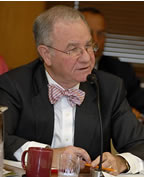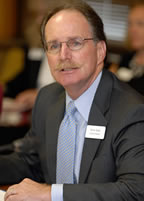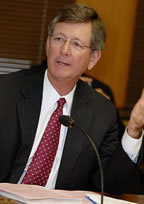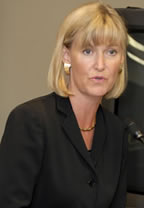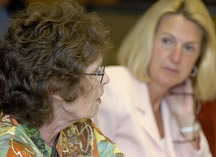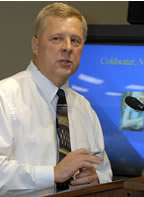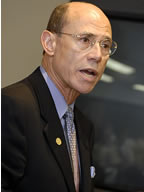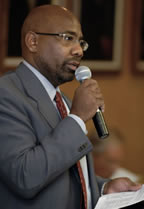Board of Regents urges state to reinvest in public university in 2007-09
MADISON—The University of Wisconsin System would use reinvestment from the state to graduate more students, attract more college graduates to Wisconsin and help grow knowledge-economy jobs for Wisconsin under the 2007-09 biennial budget request approved Thursday by the Board of Regents.
“This is a dramatic and important turning point for the university,” said Board of Regents President David G. Walsh. “With state funding and support from the Governor’s Office and the Legislature, the UW can keep tuition low, open more slots for Wisconsin students and do even more to help grow Wisconsin’s economy.”
The Board of Regents is asking for state funding in the 2007-09 biennium to improve access, affordability and service at each of its 26 campuses and through the statewide UW-Extension. If the state fulfills this request for state funding, the average tuition increase would be less than 2.5 percent over the biennium — the lowest requested increases in at least 25 years.
The budget request, titled “A Growth Agenda for Wisconsin,” would allow the UW to:
- meet state needs in educating more teachers, nurses, engineers and health-care professionals;
- expand student enrollments;
- recruit and retain faculty and academic staff;
- improve student academic performance, retention and graduation across the system; and
- build the university’s research capacity, particularly in the Milwaukee and Chippewa Valley regions.
The budget proposal focuses on growth, access and affordability, said UW System President Kevin P. Reilly. The initiatives proposed by UW institutions show how the UW System would accomplish these goals by enrolling more students, retaining more students and building the university’s capacity to conduct research, he said.
The request for an ongoing base operating budget increase of $120 million in state tax dollars and student tuition would cover new programs and the university’s existing costs. That is $90 million less than the Board’s request two years ago. Approximately two-thirds of that total would go toward meeting standard budget adjustments, including rising costs for utilities, fringe benefits and debt service. In 2006-07, state general purpose revenues accounted for less than 25 percent of the public university system’s total operating budget.
“Such a relatively modest reinvestment will let us move ahead with Growth Agenda in a way that preserves the quality of education we offer our students,” Reilly said.
Reilly said he was pleased to have heard from business and community leaders all around the state who “enthusiastically support” the university’s proposals.
“The Growth Agenda cannot succeed without them,” Reilly said.
The Board’s request also includes funding to support initiatives that would help increase college aspirations and access for two distinct student populations. The Wisconsin Covenant would provide state financial aid to cover college tuition costs for students who pledge to take rigorous high school coursework and prepare themselves for college. The Adult Student Initiative would identify, recruit and better serve adult, nontraditional students across Wisconsin who want to earn a college degree.
“The Wisconsin Covenant and the Adult Student Initiative are the twin pillars of this budget request,” Reilly said. “Taken together, they’ll allow this university to produce more of our own grads to attract more from out of state to Wisconsin and to grow the high-wage, knowledge-economy employment that will keep those graduates here.
The Board also unanimously approved a capital budget for the university that would require $135 million in state-supported bonding for new major projects, remodeling and expanding academic facilities. The university has pledged $45.6 million of private matching funds for these projects. In addition, the Board is seeking authority to construct $293.9 million of new projects that will not require any state support. The Board also requested $130 million in state-supported bonding for maintenance, repair and renovation of existing academic facilities.
David Miller, UW System assistant vice president for capital planning and budget, reminded the Board that the majority of university buildings were constructed in the 1960s and 70s. He said that the buildings were not constructed in a way that can handle today’s advances in technology used for teaching and learning.
Reilly reminded the Board that the UW System is a “lean, mean, university machine” with administrative overhead that is 4 percent lower than peer universities. He added that the UW’s support per student is $1,228 less than the national average.
“We have been productive and efficient in managing deep budget cuts in recent years. Now, it’s time to reinvest in the state’s public university system,” Reilly said. “Achieving the ‘Growth Agenda for Wisconsin’ will require both increased productivity by the UW and increased public investment. This is a budget designed in the interests of students and their families to accomplish both.”
Regent Mark Bradley of Wausau confirmed that the budget requests a 4 percent average annual increase in state support, while the requested average annual tuition increase would be 2.48 percent.
UW System does not anticipate substantial changes to cost estimates when the Department of Administration finalizes the UW System’s base cost-to-continue budget, said Freda Harris, assistant vice president for budget and planning.
Some Regents voiced concern about a proposal from UW-La Crosse that would raise student tuition to generate additional revenue for financial aid, improved academic programming and support, and teaching faculty. Regent Thomas Loftus of Sun Prairie proposed that the item be approved only if the campus agreed to contribute 50 percent of new revenue toward financial aid. But other Regents and UW-La Crosse officials noted that some revenue should be reserved to hire additional faculty and staff to support the greater number of students it anticipates will enroll at the campus.
“The important part of the initiative is that this could be a big part of the future of University of Wisconsin campuses,” Loftus said.
Regent Brent Smith of La Crosse noted that he has heard from faculty, staff and students at UW-La Crosse who support the growth and access plan, which would provide 25 percent of additional revenues to students as financial aid, as well as provide funding to hire additional faculty and staff to teach and serve the greater numbers of students.
“Their support of this plan has been critical,” Smith said.
Regent Mary Cuene of Green Bay agreed that reserving some of the additional revenue to hire staff would be essential for the plan.
“Success depends on having the support from the university,” Cuene said. “Without those, the project is a failure.”
Student Regent Chris Semenas of UW-Parkside said he could not support a budget proposal that would raise student tuition by any amount. He particularly noted that major cuts in federal financial aid mean tuition increases present student with an even greater challenge in affording college. Regent Gerard Randall of Milwaukee also said he did not favor the UW-La Crosse proposal, and therefore, did not vote for the entire budget proposal.
Regent Danae Davis of Milwaukee said she was excited to follow the progress of the UW-La Crosse pilot program.
“We ought to look at doing things differently,” Davis said, noting that she was encouraged by the strong local support for the idea.
Regent Jesus Salas of Milwaukee said he would not support implementation of the budget if the Legislature and the Governor return it to the Board next year absent the initiatives that Regents approved.
Following an amendment Salas proposed, the program, if implemented, will be reviewed annually at the campus level, and the Regents will conduct a comprehensive review of the pilot after six years.
Loftus also said campuses should commit funds to support the additional student veterans expected to attend the UW System under the expanded Wisconsin GI Bill, which provides 100 percent tuition remission to Wisconsin veterans.
“The more students from this population that are at a campus, the better the education will be for all students,” Loftus said. The Board approved a motion to consider the outcomes of services to student veterans as part of future chancellor performance evaluations.
Approximately two dozen students held signs and banners as they attended Thursday’s meeting to ask Regents to consider a “freeze” on tuition levels and to encourage the state to commit to higher education reinvestment.
Regent Jeffrey Bartell of Madison said he was concerned that state continues to shift financial burden to students and families.
“This is a process that’s been going on for a long time,” Bartell said. “By raising tuition to cover the gap, I think we are providing the cover for the decision-makers down on the other end of State Street. We just can’t allow this to continue.”
He added that a 2.48 percent average annual tuition increase is reasonable and that he hopes it “starts a trend.” He added that he would not want to see the UW eliminate programs if the state does not contribute the requested funding. “If the Legislature thinks higher education is not a priority, then they can bear the consequences of that,” he said.
Regent Charles Pruitt of Shorewood said the budget request is a step forward that responds to a challenge to hold down tuition. He noted that all stakeholders would need to advocate for the budget to keep tuition low.
“This could be very much a turning point kind of budget request,” Pruitt said.
Reilly thanked the Board for supporting the “Growth Agenda” for Wisconsin and said Regents would be called upon to help explain the budget request in months ahead.
Following budget guidelines issued by the Wisconsin Department of Administration, the UW System will formally forward its budget request by Sept. 15. The request will be considered as the Governor’s Office prepares to release an overall state budget proposal early next year.
Walsh said he was impressed that business leaders across the state have volunteered their strong support for the Growth Agenda proposals, which would strengthen the university’s role as an economic engine for the state.
“It’s time to feed the engine,” Walsh said, sending a message to state leaders: “We’ll keep the tuition down, if you’ll make the investment.”
Lawton describes UW’s “LEAP” into knowledge economy
Wisconsin’s Lieutenant Governor Barbara Lawton spoke Thursday about how Wisconsin has positioned itself to lead a national “Liberal Education and America’s Promise” (LEAP) campaign. The state was chosen to be the first participant in a pilot program that will promote the values of a wide-ranging, multi-disciplinary “liberal” education.
Lawton discussed how many of today’s employers are seeking “360-degree students,” who not only excel in their specific fields during their time in college, but also are capable in many educational disciplines.
“When we speak of liberal education … we speak of what today’s college graduates need to know to be successful,” she said. “A liberal education is quickly becoming the price of admission to a 21st-century knowledge economy.”
That success, Lawton said, comes from a broad educational experience that prepares students for the emerging knowledge economy and deepens the nation’s talent pool for innovation.
Lawton said colleges and universities must emphasize math and the sciences and how the fields relate to other areas of life. This can be accomplished, she said, internally in faculty governance groups, and externally through advocacy by leaders in the education community, such as the Board of Regents, legislators or other prominent public figures.
The LEAP campaign, Lawton said, will create a framework for what constitutes a “liberal education” that can provide an intellectually engaged workforce in Wisconsin and nationwide.
“Think of LEAP as a powerful centrifugal force for change,” she said.
Altering the way citizens understand the benefits of higher education is essential to the success of such a campaign, and to the continued success of American higher education as a whole, Lawton said.
“Too many students headed this way think of college as a private, not public, good,” she said.
Regent Judith Crain of Green Bay reinforced this point, saying “we need to talk in different terms about the importance of higher education.”
Lawton said educational leaders can help shape public discourse about higher education into a discussion about how it impacts the economy, adding that Wisconsin is a “low-wage state” that needs more citizens with four-year college degrees.
Lawton called on Wisconsin’s educational, political, civic and business leaders to promote the values of a liberal education. LEAP, she said, will provide opportunities for collaboration between these sectors.
“I am confident that we can, and will, recapture the public’s interest in higher education,” she said. “I feel like we’re a small step away from doing a very, very big thing for this state.”
Expert: Public reaps benefits from higher education
Public investment in higher education provides benefits that make major positive impacts on a state’s economic and social success, the Board heard Thursday.
John C. Burkhardt, director of the National Forum on Higher Education for the Public Good at the University of Michigan, made the case for community advocacy for higher education in a presentation titled “Building on a Great Idea: Elaborating the Benefits of Higher Education in Wisconsin.”
The presentation, which included work from Ph.D. candidate Nate Daun-Barnett, stressed how best to communicate the benefits of higher education to the public most effectively.
“If we are to sustain those benefits in Wisconsin, and in the nation as a whole, we have to be far more deliberate in articulating the full range of advantages [that come from a strong investment in higher education],” he said.
Higher education already has popular support in the United States, Burkhardt said, citing that 50 percent of Americans say their lives and economies have been enriched through colleges and universities. Still, Burkhardt repeated the need for community-level discourse, such as discussions with families and parents, about how higher education benefits citizens in order to sustain this support.
Burkhardt’s said educational leaders need to shift the way they portray the benefits of higher education to American citizens.
Years ago, as the country faced a downturn in college enrollment, higher education’s leaders described the college degree as a means for the degree-holder to make private gains, he said. The result was a large number of degree-holders whose primary focus was their own financial benefits.
“We have so many lawyers, yet we are still a nation seeking justice,” Burkhardt said, as one example.
Burkhardt said the United States has become a “transactional society,” and that the “transformational experience” that college provides has somewhat been left by the wayside. A community-based approach, he said, can help determine what constitutes the “public good.”
Regent Loftus cautioned his fellow Regents against solely emphasizing the economic benefits from an investment in higher education, especially as many of Wisconsin’s citizens continue to experience rising education costs. He echoed Burkhardt’s call to emphasize the transformational nature of the college experience.
“If every argument we make is on the basis of short-term economic gain, we find ourselves in a pattern from which we cannot escape,” Burkhardt said.
Business, Finance and Audit Committee
UW System support for programs that would provide grants to student veterans and students from lower-income backgrounds would be shared with the state under two resolutions the committee voted Thursday to forward for consideration by the full Board.
Regents have consistently said that providing support for students in these populations should be a state priority. The programs, the Veterans’ Tuition Grant and the Hold Harmless Tuition Grant, would be funded and administered as part of the budget for the Higher Educational Aids Board (HEAB), which administers state financial aid programs.
HEAB director Connie Hutchison said her agency has been working cooperatively with officials at UW and other colleges and universities to develop these grant programs.
Sharon Wilhelm, interim associate vice president of the UW System Office of Policy Analysis and Research, offered Regents a comparison between the funding that would be provided to students under the proposed Wisconsin Covenant and the proposed Hold Harmless Tuition Grant. The grant would assist current UW students, who would not be eligible for the Wisconsin Covenant. That proposed program would begin in 2011.
Wilhelm said the Hold Harmless Tuition Grant would offer students state funds to cover tuition and fees not covered by other financial aid, but would leave costs of attendance to be paid by the student, likely through loans and the expected family contribution. The Wisconsin Covenant, by comparison, would provide more state funds to cover tuition and fees, allowing the student to use federal financial aid to offset additional costs of attendance, such as room, board and textbooks.
The resolution would also urge the state to modify the UW-Wisconsin Higher Education Grant to provide a “dollar-for-dollar” increase in the grant to match any future tuition increases.
The Veterans’ Tuition Grant would follow the state’s approval of a 100 percent tuition remission for Wisconsin veterans, known as the Wisconsin GI Bill (2006 Wisconsin Act 468).
Chancellor David Markee of UW-Platteville said he expects an online criminal justice program to serve a large number of student veterans, and that funding for veteran tuition remissions would assist the campus in recovering costs for these kinds of programs.
In other business, the committee approved a motion that would direct the divestment of university funds from companies that do business with the government of Sudan, a country which the United States has sanctioned for acts of genocide.
Regent Charles Pruitt of Shorewood said the decision would be “the right thing” for the Board to do. If approved by the full Board on Friday, the action would follow similar moves by other colleges and universities around the nation.
The committee also learned that a systemwide background check policy would allow the university to treat all employees equitably, while ensuring safety and security of students and staff on campus.
Al Crist, UW System assistant vice president for human resources, said that while UW institutions all adhere to state and federal laws, there is no current systemwide policy to guide background checks of applicants for employment within the university.
UW institutions are now working to develop a policy for checks for all new hires, and would identify categories of jobs that would require hiring authorities to follow greater restrictions. Any policy would follow due process for all applicants, Crist said.
Crist said he expects to share ideas with the committee in November.
Regent Peggy Rosenzweig of Wauwatosa suggested that the UW System conduct its own review of a project that attempted to implement a systemwide appointment, payroll and benefits system.
Rosenzweig noted the public interest in what happened during the six-year project, which required an investment of $26 million. The project was discontinued this year. The university will now cooperate with the Department of Administration to implement a systemwide network to track payroll and related information using a software contract expected to be more efficient than the previous project.
The committee will consider in October whether to take up such a review.
The committee also:
- Authorized the UW System Office of Operations Review and Audit to begin a review about the costs of textbooks;
- Heard an informational report on investment of funds in tobacco-related holdings;
- Received a quarterly report on gifts, grants and contracts;
- Heard an update about projects underway at the Legislative Audit Bureau, including an annual audit of the university;
- Received a report on early-return-to-work efforts at UW institutions.
- Heard the report of the Vice President.
Education Committee
The Board of Regents will soon have a financial analysis of what it would cost for various ways to meet the educational needs of Waukesha County, and the UW System will soon implement two new academic programs in Waukesha.
The Education Committee heard from UW System Executive Senior Vice President Don Mash, UW Colleges and UW-Extension Chancellor David Wilson and UW-Milwaukee Chancellor Carlos Santiago regarding the ongoing analysis.
Mash updated Regents on the work of a group studying what the UW System could do to enhance higher education opportunities in the Waukesha and Milwaukee County areas, given limited financial capacity.
“Today, it is our expectation that by November 15, a report will be issued to President Reilly from Chancellors Wilson and Santiago addressing the educational needs of Waukesha County,” he said.
Regent Davis strongly urged Mash and his colleagues to prepare an analysis of that report for the Board’s December 2006 meeting.
Mash said that during his group’s listening sessions, the Waukesha County Action Network identified six academic programs the region’s business community marked as vital. He said the UW System hopes to bring two of those programs to UW-Waukesha by September 2007.
Wilson identified three options for UW-Waukesha. These include:
- A “university center approach” whereby enhanced academic collaboration would take place between UW-Waukesha and UW-Milwaukee.
- An institutional merger of UW-Waukesha and UW-Milwaukee.
- The transformation of UW-Waukesha from a two-year UW Colleges campus to a four-year university.
Wilson said he would recommend which of the three would be best after a complete financial analysis of the options was completed. Wilson also expressed his intention to accurately gauge the needs of UW-Waukesha’s students and faculty before making a recommendation regarding the future of the institution.
Santiago said UWM is working with UW-Waukesha to provide educational opportunities to what he called the “fastest growing county in Wisconsin.”
“The process we have launched will hopefully be a productive one,” he said.
Alan Stager, the president of the UW-Waukesha Student Government Association, spoke strongly in favor of UW-Waukesha remaining a two-year institution. He pointed to the “gateway” the institution provides to four-year campuses for students who initially would not attend such campuses.
Regent Semenas echoed these sentiments, saying he did not believe there is a need for another four-year campus in a region that already houses two others, particularly in a county containing the third-most four-year college-degree holders in the state.
“We need to look at different areas of Southeastern Wisconsin that need more baccalaureate degrees,” he said, citing Racine County and areas of Milwaukee as examples.
In other action, the Education Committee:
- Approved a program authorization for a B.S. degree program in Microbiology at UW-Milwaukee;
- Approved a program authorization for a B.S. degree program in Health Science at UW-Stevens Point;
- Approved revisions to faculty personnel rules at UW-Whitewater and UW-Extension;
- Approved the extension of the UW-Milwaukee Charter School contract for the Milwaukee College Preparatory School;
- Authorized UW-Eau Claire to begin the search for a new Provost and Vice Chancellor;
- Heard the report of Cora Marrett, UW System senior vice president for academic affairs, regarding the UW System’s research and public service, 2005 drop rates and annual program planning and review.
Physical Planning and Funding Committee
UW-Milwaukee will sell the official chancellor’s residence in Shorewood near the UWM campus, if a resolution approved by the Physical Planning and Funding Committee is approved Friday by the full Board.
The committee learned Thursday that it would require a significant investment of private funds to upgrade the house to meet ADA accessibility requirements so it could be used for public functions.
The resolution approved in committee Thursday would require that the residence at 4430 North Lake Drive, be sold at a price not less than the average of two appraisals. The net proceeds of such a sale would be held in trust until the campus and Board determine a future plan for a chancellor’s residence. Earnings on the trust fund would be returned to UWM for its use.
The committee also approved resolutions that would grant authority to UW-Oshkosh to purchase property for administrative/office use to relieve overcrowding in Dempsey Hall and grant authority to construct various facility maintenance and repair projects at UW-Madison and UW-Platteville.
The committee also learned that the State Building Commission approved about $49 million for UW projects at meetings this summer, according to a report from Assistant Vice President David Miller. This includes $36.3 million in General Fund Supported Borrowing, $6.8 million in Program Revenue, and $3.5 million in gift and grant funds.
Photos: James Gill
###
The Board of Regents will resume its August 2006 meeting on Friday, Aug. 18, at 9 a.m. in Room 1820 Van Hise Hall on the UW-Madison campus.

